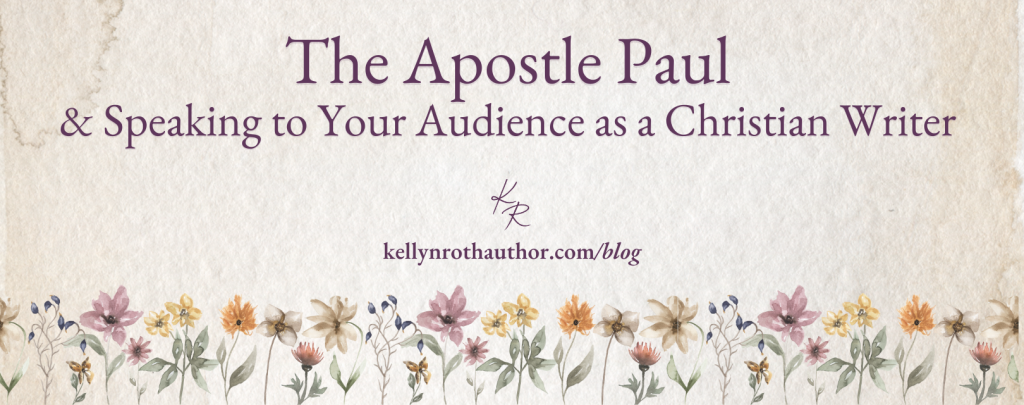That title may have bemused you, and honestly, I’m not sure I have the writing talent to communicate these ideas clearly, so if you don’t understand this, blame me. I can only say I did my best.
The other day, I was reading 1 Corinthians 9, and I found myself confused. Not an unusual thing for such a weak Bible scholar as myself, but when I’m learning that when I run into a natural limitation, the answer is not to feel like an idiot—it’s to find a way around my idiocy.
Therefore, I looked up sermons on 1 Corinthians 9 and found this one, which I really enjoyed. And, of course, because I am incapable of NOT making the Bible all about my current struggles, rather than taking it at face value, I applied it to my own life.
And lately, I’ve been thinking a lot about audience, and positioning myself, and all those fun things that are entirely too vital for a Christian fiction writer’s life (in part because it’s important for all writers, but also because Christian fiction readers are probably the most difficult audience to write and market toward).
1 Corinthians 9, simply put, is taken up with Paul explaining why he’s qualified as an apostle of the Lord and also diving deeper into his personal response to concepts he explained in greater detail in 1 Corinthians 8, such as the whole “if food makes my brother stumble, I will never again eat meat, lest I make my brother stumble” we are all so familiar with. Essentially, Paul is telling us how the concept of “making your brother stumble” works out in his own life.
What caught my attention during my reading and during the sermon itself was the following verses (19-23) in chapter 9:
“For though I am free from all men, I have made myself a servant to all, that I might win the more; and to the Jews I became as a Jew, that I might win Jews; to those who are under the law, as under the law, that I might win those who are under the law; to those who are without law, as without law (not being without law toward God, but under law toward Christ), that I might win those who are without law; to the weak I became as weak, that I might win the weak. I have become all things to all men, that I might by all means save some. Now this I do for the gospel’s sake, that I may be partaker of it with you.”
I circled this in my Bible before even listening to the sermon and made the somewhat judgmental comment in the margins of my lovely floral journaling Bible that “This is what Christians with their variety of denominations refuse to do. They are incapable of preaching the Gospel to those who are not convicted or called exactly as they are.”
I discussed this in a post on my Instagram lately, but all Christian fiction writers have essentially the same motivation: they seek to honor the Lord in their writing. (Technically, all Christian writers, regardless of if they write Christian fiction or not, have the same goal, but I’m limiting this discussion to Christian fiction writers as that is what I myself write. However, for the most part, the same concepts apply universally to Christian writers! And to say that it’s not true of Christian writers who don’t write Christian fiction is to ignore both historical Christian writers and simple common sense about how representing our faith works.)
Yet we give into quarrelsomeness. We lose track of our higher calling, and the true ways the Lord may be leading us, to fight over the small details—refusing to admit that, perhaps, we’re comparing apples to oranges (or Greeks to Jews, if you will) as we all write things that WE feel led to do … and then stomp on those who are not similarly led, as if there is only one type Christian culture—the “good” type, YOUR type.
Now, as you read these verses, and hear my thoughts on them, you may be going, “Now, wait, Kell, Paul didn’t mean that he was just going to abandon all morals and do all the evil things whoever he was with was doing to fit in.” Nope, and I know that. In the sermon I linked to above, the pastor did a far better job explaining this, but when Paul says he has become “all things to all people,” there are many examples throughout the New Testament of how he sacrificed the freedom he gained through his salvation, through his knowledge, and through his strength of spirit to serve the people he was delivering the Gospel to.
Essentially, what Paul is saying is that if he is faced with a situation where his personal lack of convictions on a subject get in the way of preaching the Gospel, he would far rather not eat meat (or make Timothy get circumcised) than do anything that stood in the way of his calling.
When he was with the Jews, he observed their ceremonial laws. When he was not, well, he dropped them. Simply put, Paul was unwilling to let neither legalism or the personal convictions of others get in the way of sharing the Gospel. He emptied himself, becoming a vessel to bear the Lord’s grace and truth.
If you know Paul at all, you know he does NOT mince words. He is not a wishy-washy writer, nor does he stray from what may offend people. I think Paul’s writings contain some of the most controversial takes in New Testament, even today! But he sticks to the essentials. He’s not getting caught up on issues that don’t matter. He’s not arguing with the Jews about whether or not circumcision is still a thing. Poor Timothy.
I’m concerned you’re going to take my Timothy jokes too seriously, but please don’t. I am being facetious.
I have chosen to do the same thing from time to time, and any WISE Christian fiction writer will, too. There are some subjects I don’t publicly discuss, and the ones I do are becoming more and more refined as I look at what will hinder my message—and what will more clearly communicate it.
The Power of Writing
Words are powerful, and writers are the wielders of words. When another name for Christ is “the Word of Life,” I think we all know that what we will be held accountable for what we write, especially as we are inherently placing ourselves in a position of authority with our platforms and our novels.
It’s not about lying or not being honest about what we truly believe. It’s about sticking to what’s relevant. What would be totally irrelevant to you might be an issue that I feel led to speak about—and vice-versa. Intentionality is the name of the game here.
I have certain subjects that I could speak about less or more that I do not. I could talk more about LGBT+ subjects. I could discuss politics. Science. Current culture. I could probably talk about border collies all day and turn it into a meaningful message that serves God, but I don’t. So many things … but because these subjects are not relevant to the audience I’m serving, I am not a writer about “so many things.”
This doesn’t mean some of my messages won’t have a wider audience. Truth is truth … it has a more universal appeal. My books and blog posts have been read by a wide variety of people who take from it what God will have them take from it.
But the way I’m framing things will always be with specific people in mind. Others will take different sides, discuss different issues, come at it from different angles. And we NEED those. Because there is an infinite supply of people in this world, and that means we need an infinite supply of other people who are working for God to serve those people.
Now, as is again pointed out in the sermon I referenced at the beginning of this post, the office of a pastor—or Apostle—is a specific one. You have to be strongly led to be willing to undertake what Paul (let alone Timothy) did. But even for us laypersons, generally not led in the same way Paul was, we can still apply these tenets.
Who are the people we’re sharing our message with? What is at the heart of our ministry? Is anything we’re doing or saying getting in the way of serving that audience? Have we niched down so much that we are actually incapable of serving anyone at all? Or perhaps our audience is too broad, and we need to take a step closer?
Yet does this mean that as writers, we are to become all things to all readers just as Paul became all things to all men? Well, if we are speaking to all readers, sure, but we’re not, are we? We are only speaking to our market, our audience.
Paul was not “all things at all times.” He’s not God; Paul lived under the human limitations of time, place, and surroundings. When he was with the Jews, he became like a Christian Jew; when he was with the Gentiles, he became like a Christian Gentile.
Similarly, when we are speaking to our audience, we represent Christ, and all related messages, to them in a way that they can understand. We speak to them honestly and clearly from the place they are in. We use words and terms and references they will understand; we don’t show off our knowledge at their expense. And we don’t try to be something else, because that is not what they need.
A Tangent about Identity
On a less specific-to-writing note, I will admit that I have often been terrified by the notion of not being myself. I want to be so myself that everyone who meets me immediately sees me for who I am—and I have often failed.
I was horrified by the way I turned into a chameleon for different groups. That wasn’t me, after all. How could it be?!
A goof in one group of friends; the straight man in another crowd; introverted in one area and seemingly more extroverted when in my element. And I saw some versions of myself I liked better, and some I liked less, and yet I sometimes couldn’t seem to fit those versions together in a way that made sense.
Now, this can be a bad thing—if your focus is only on pleasing the other person, if you become a chameleon in an attempt to please others. People-pleasing is a real issue, and one we all need to avoid, but I’m not talking about that today.
Because as in my case, if you are more focused on the authentic self than serving authentically, well, that’s just as bad.
I have tried to manufacture a better self by combining all my versions, but sometimes that leads to the wrong foot being put forward at the wrong time.
And here’s what I’ve realized: authentic self, that great American ideal, that Taylor’s version, Disney-princess thought process is nothing compared to living for Christ. I have often equated the two together, knowing that the Lord created us all individuals and our most true self will emerge through the Lord.
But that’s not as much done through careful self-reflection and cautiously trying to sort out what v0ersion is most godly. No, it’s best done through obeying God … and knowing He will not let the beautiful individual He created disappear.
I’m not going to become less me by focusing on God. I have always known this. Yet it’s so easy for me to get caught up in being myself, because after all, God did make me for a purpose, that I lose sight of what’s most important.
The message. The truth. The thing that cannot be taken away. And even if you’re not sure what that message is, you can start using your strengths now to serve God, and you can certainly obey whatever He tells you without question, now.
That’s the right step. Not the step you take ten years from now once your ducks are in a row. And you know what? Once you get to Heaven, it’s all going to make sense.
Even what might have seemed like a side road or a distraction at the time will turn into a beautiful portrait of God’s care and love for you … and for those He has put you in this world to serve.
TTFN!
~Kell~
Are you interested in getting to know me & my books better? Join my email list!



9 Responses
#1: I think I copied half of this post to comment on and save for future reference, and now that I have two pages of a Google doc full of quotes from this post, I think I’ll just hold onto my individual remarks. ????
#2: I really needed this post, because I’ve been not necessarily struggling but kinda struggling with authenticity and serving and being focused on the right thing lately…so this was insanely relevant and helpful. Thank you SO much.
#3: This was just a GENUINELY GOOD POST, chock-full of TRUTH. Hard truth that everyone needs to hear. So thank you for sharing this, Kell!!! Once again, your thoughts have enriched my own!
Aww, Grace! You’re so kind! I think having quotes saved is one of the greatest compliments someone can give you about your writing, so I’m thrilled something I said was worth saving!
Authenticity is such a tricky one for me because a) it’s so vitally important to me, and I can’t seem to shake that sense of vitality no matter how I reframe my thoughts, and b) I don’t want to get so caught up on it that I get lost, which is a tendency of mine – to always circle around “why am I here?” and not think “what can I do now that I am here?” But hey, I’m trying to overcome that tendency.
This was so helpful and encouraging!
I’m so glad! 😀
So profound, Kelly. Well done!
Thank you, Andrea! It was one of those “sudden ideas I just had to write down” posts!
This was amazing!!! Thank you for sharing this, Kell!!! <3
Absolutely! Thank you so much for reading it!